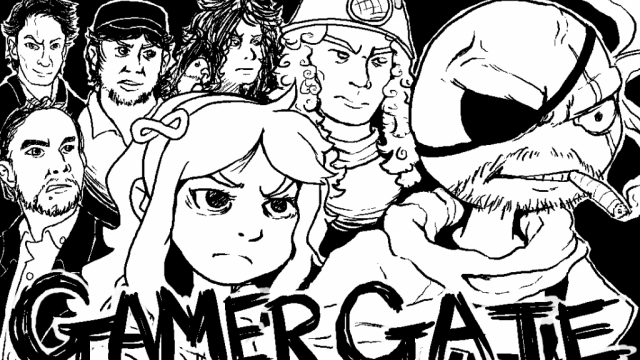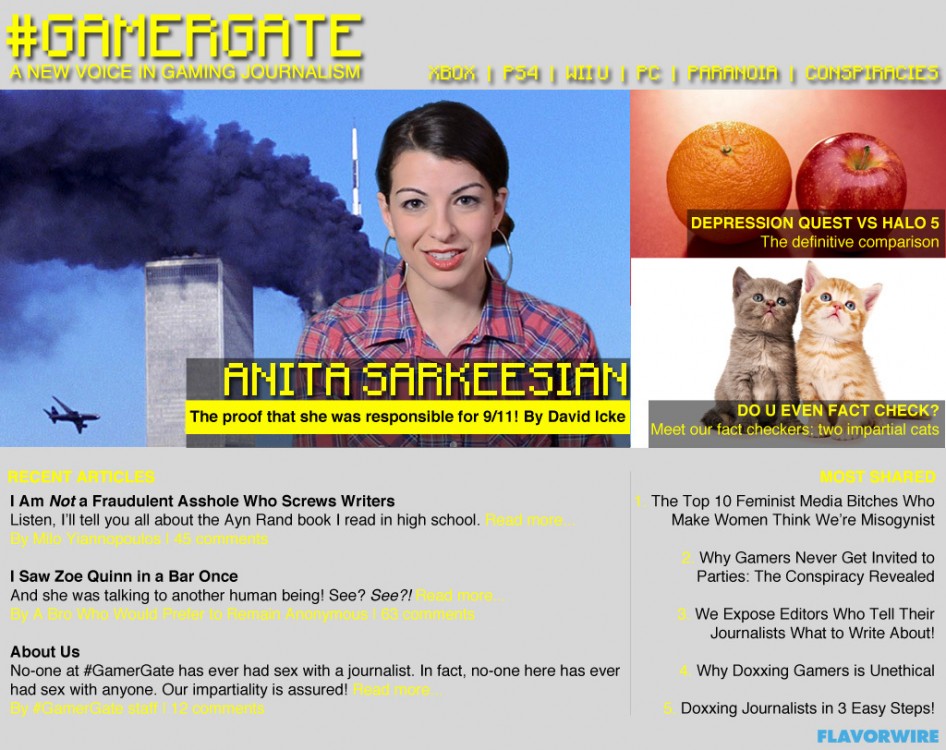
To the average person, video gaming doesn't typically inspire thoughts of tawdry scandals, media corruption, ideological warfare or coordinated consumer revolts. However, a debate over journalistic ethics in the gaming press has recently led to explosions of such stories, stirring conversations about gender and ideology through the blogosphere and mass media that many believe are long overdue.
Though defining the meaning of #Gamergate depends largely on whom you ask – with everything from journalistic ethics to charges of cultural sexism being posited as the central narrative – the questions raised and answers offered in respect to matters of identity politics, ideology and the roles of media in popular discussion are almost impossible to avoid.
It began with alleged ethical misconduct by writers at the gaming websites Kotaku and Gamasutra, among others, centering on the seemingly nepotistic relationship between reviewers and certain independent game developers. The outrage since within gaming communities themselves has led to an almost immediate demand for ethics reforms within the industry.
While some have acknowledged these concerns and instituted new ethical standards, others rebuked the criticism and quickly engaged in coordinated smear campaigns against their very own audiences.
As further exposure of personal, and often sexual, relationships between developers and journalists led to even greater uproar, it soon came out that in addition to such nepotistic collusion, many members of the gaming press were found to be colluding with one another by way of a secret email group called "GameJournoPros." In the group, people discussed means to not only help the careers of friends and sometimes sexual partners, but also how to use their positions to advance the ideological and political narratives they favored.
Though initially derided as conjecture bordering on conspiracy theory, evidence of this collusion and coordination for narrative control spilled forth in a single day following the creation of the hashtag #Gamergate by conservative actor Adam Baldwin. Due to his tweeting about the controversy, numerous websites – including many owned exclusively by Gawker Media – simultaneously posted articles effectively declaring gamers to be “dead” or “over.”
With the media piling atop what was already an uproar over private and possibly quid-pro-quo ethical violations within the gaming press, gamers called out what they saw as an obvious and insulting conspiracy against them. Those feelings were further compounded, following revelations about the “GameJournosPro” cabal, when leaked transcripts from a think tank of academic social engineering theorists focused on gaming, known as the Digital Games Research Association, or “DiGRA,” were exposed in a grassroots investigation.
In the series of leaked transcripts from DiGRA meetings, academic social theorists – many of whom are unabashed in expressing their ideological agendas – discussed the best means through which bring their very specific visions for gender, race and sexual equality to the world of video games.
For many of you who – and no doubt there are many – who missed the brouhaha, the complete timeline of events involving scandal can be seen here. But for the purposes of this analysis, the undertones of ideology and community leap out as the most fascinating elements worth discussing.
In essence, the conflict comes down to cultural ideologies: one side that is ideologically well-defined, the other only partially defined and variant at that. On one side, there is radical feminism and a fringe element of the newer hardline, identity-focused political left that declares video gaming to be the new battlefield upon which the white male patriarchy is being confronted. On the other, a community of gamers not typically accustomed to fighting political or ideological battles but used to bitter competition and often brutal online disputes.
While the former enjoyed a fairly unchallenged run in the mainstream media, decrying the GamerGate movement as a sexist, misogynist hate group, the latter has found its strength primarily on social media with the #GamerGate hashtag trending well above all attempted counter-campaigns.
Additionally, yet unsurprisingly, some loud voices have come from the right as well as center-right, with Breitbart columnist Milo Yiannopolous and American Enterprise Institute scholar Christina Hoff Sommers combating the often wild allegations of hate and bigotry the movement has endured.
While to a certain degree it could be seen as a conventional left-vs-right conflict, respective of the many prominent speakers and outlets involved, an examination of the dynamic support base within GamerGate tells a much different story.
Recently, the Twitter profile @OccupyWallSt declared its support for the movement following a series of stridently anti-GamerGate articles and interviews in the mainstream press, tweeting:
“Remember how the media colluded to destroy Occupy Wall Street? Now they're colluding to destroy gaming.”
Additionally, Wikileaks founder Julian Assange offered his own statements in support of the movement during a session on Reddit, when he compared online censorship of GamerGate threads to broader censorship efforts by governments. Later, @Wikileaks tweetedrepeatedly about the correlations between media collusion on GamerGate and what's going on in the broader scope of agenda driven news media.
Beyond these overtly political supporters, a complimentary sister movement to GamerGate has also emerged, further contesting the ideological claims of the movement’s opponents. Following increased claims of GamerGate being the province of straight angry white males, many minority, female and LGBTQ gamers began using the hashtag #NotYourShield, insisting that it did not fall to social justice ideologues to speak for them or use them as props in their narrative arguments.
Since its launch, NotYourShield has grown into a more direct rebuke against many of the narratives that are core to fringe-left identity politics – with critiques often being made by many who themselves identify as liberals or progressives.
Much akin to the Occupy Wall Street movement, Gamergate has found itself struggling to maintain balance in respect to its narrative and goals as a new leaderless movement steps forward to challenge journalistic ethics and, to a small degree, the ideological certainty that frames many modern political crusades.
Like Occupy, the coalesced factions that have come into and that continue to join the movement constitute a far broader array of philosophies and political ideologies than their detractors would suggest. As before, and so again, the organic rise of a movement based in opposition to corruption, collusion and autocracy – even when sprung from an environment as politically irrelevant as video games – is creating odd alliances and surprising political bedfellows. Not to mention making many question what it means to be left, right or in the center.
3 WAYS TO SHOW YOUR SUPPORT
- Log in to post comments












